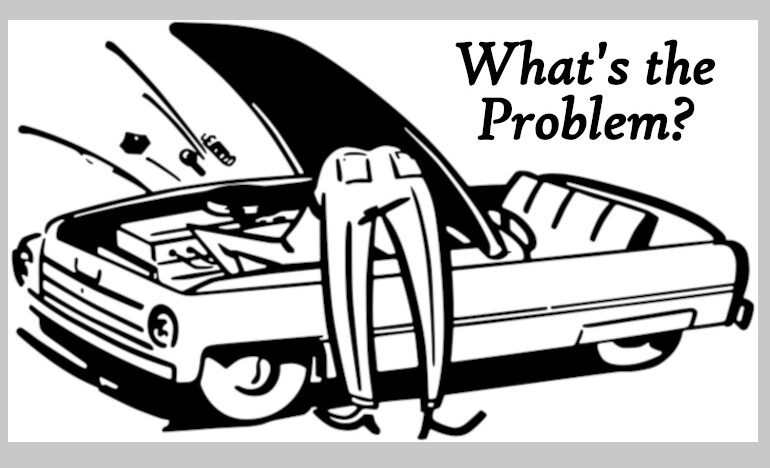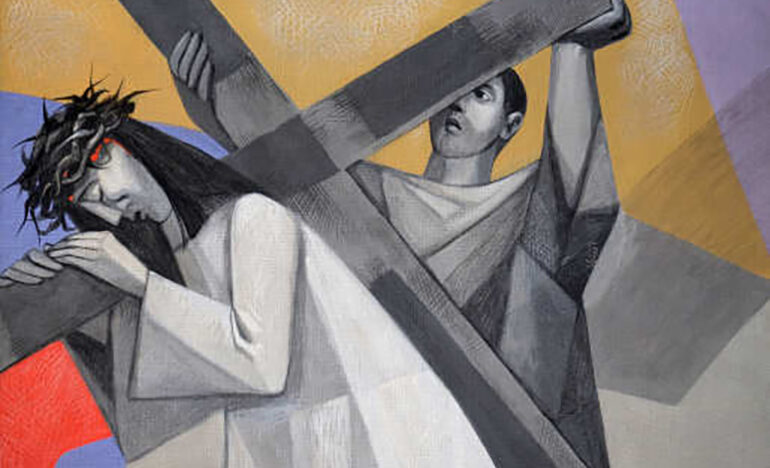What’s the Problem?

An Assembling God’s Puzzle video
By Fr. Garry Richmeier, C.PP.S.
The challenge of addressing what isn’t working well is a part of life’s puzzle that we’re stuck with, whether we like it or not. We tend to approach many of our problems the same way we do when our car starts making a strange noise or stops running like it used to. We take it to a mechanic to see what is wrong, the mechanic will look for the part that is broken or malfunctioning, fix or replace it, and the problem will be solved.
It’s a simple, clean, straight-forward way of thinking about a problem and fixing what isn’t working right. Sometimes we look at every problem like that and assume it can be solved by “fixing” the broken or malfunctioning part. But that idea and that approach do not work well when it comes to problems dealing with human behavior and human relationships.
The medical profession can sometimes operate this way. A doctor may open the artery that is blocked, or heal the ulcer, and declare the patient “fixed.” But the blocked artery or ulcer may be only one symptom of the larger problem, which may include unhealthy diet, lack of exercise, high levels of stress in the job or in the marriage, alcohol consumption, depression, anxiety, etc.
Really fixing the problem would require addressing all parts of the problem. But of course, the goal of modern medicine primarily is to fix the part that is broken. The other parts of the problem are referred to other specialists, like psychologists or fitness gurus.
In family counseling, parents bring their child to me because the child is causing problems in the family. Often this happens when the child turns 13 or 14. They want my help in getting the child to stop acting out, because they see that as the problem. In counseling terms, the child becomes the “identified patient,” who supposedly needs to be repaired so the family runs smoothly again.
Of course, the problem is never that simple. The acting out is often only a symptom that points to things not working well in the rest of the family, especially between mom and dad. The acting out behavior often serves the purpose of uniting the parents in a common cause — helping their child — while enabling them to avoid or ignore other, potentially marriage-threatening relationship problems.
We have many problems we find almost impossible to solve, whether as individuals, families, societies, or the human race. A big reason is because we try to solve them by trying to “fix” the part that is broken without considering the bigger picture. We single out the Identified Patient, blame them for the problem, and miss all the other things contributing to the problem.
Believing problems can be attributed to a single cause like this is referred to as “Reductionistic Thinking” — things are reduced down to a single element. We are accustomed to it, but it does not serve us well. It shows itself when people say things like “The problem with poor people is that they’re lazy.” Or “The problem with those rioters is that they’re just violent people.” Or “It is those uneducated people that keep us from moving forward as a country.”
We have a better chance at solving our problems if we resist reducing our problems down to a single cause, and take a wider view. In family counseling, this means looking at everything going on in a family to see what numbers of things are contributing to the acting out of the identified patient.
A way to imagine this is to think of each person in the family as a paper clip, connected to each of the other paper clips with rubber bands, which represent the relationship between each. When one paper clip (person) moves, it puts tension on all the other rubber bands (relationships). Each movement, either positive or negative, has an effect on the whole. So the whole needs to be involved in solving any problem. This image can be used to imagine problems in society or communities or cultures.
We tend to resist looking at problems in this way because it is more complicated, and requires much more time, effort, and resources to address any problem effectively. It goes against our “git ‘er done,” quick-fix mentality. But problems approached in this manner usually stay “fixed” longer because everyone or every group involved is included in finding a solution, and each has a stake in a positive outcome. It brings to bear all the skills, resources, and abilities of everyone involved, which makes a lasting solution more likely. The old saying still holds, “Two heads are better than one.” And it tends to create a relational dynamic among the members which is more cohesive, and less prone to major problems in the future.
It would be nice if all of our problems could be solved by simply fixing one piece of the system that is malfunctioning. Unfortunately, life is rarely that easy. But if we take a broader approach in understanding and addressing our problems, applying the necessary time and effort, we have a much better chance of solving them.
All of the videos in this series can be found here: Assembly God’s Puzzle.
Never miss an article published on the Renewal Center website: Sign up to receive our newsletters.
[Fr. Garry Richmeier, a Precious Blood priest and spiritual director, holds a Master’s of Divinity Degree from St John’s University in Collegeville, Minnesota, and a Master’s of Counseling Psychology degree from the University of Missouri-Kansas City. He is a licensed professional counselor and a licensed marriage and family therapist.]
Illustration ID 42096455 | Mechanics © Retro Clipart | Dreamstime.com — What’s the Problem? — An Assembling God’s Puzzle video
We’d Like to Hear from You!
We’d like to know what you think about this article. Send us a comment using the form below. Do you have a suggestion? Is there something you want to learn more about? Send us a note.
Related

Lent Video Five – Meditation: “Only a Shadow of You Love”
Next Sunday is Palm Sunday and next week is Holy Week. In anticipation of those solemn commemorations, today, Fr. Ron will help us pray and meditate on the Stations of the Cross.

Making a Banner for Lent Part 2
A Coffee with Padre Video
Fr. Timothy finishes his Lenten banner and continues his reflections on how colors and materials become potent symbols that bring the Lenten season alive. The final banner serves as a visual reminder of our spiritual journeys.
Categories
Assembling God's Puzzle Coffee with Padre Cooking & Spirituality Encounters of the 4th Kind Family Matters Reflections on the Eucharsitic Prayers Spiritual Resources Taize Prayers The Contemplative Life Traveling with Pilgrims of Hope Uncategorized Videos Week of Prayer for Uhristian Unity When you need a little help
